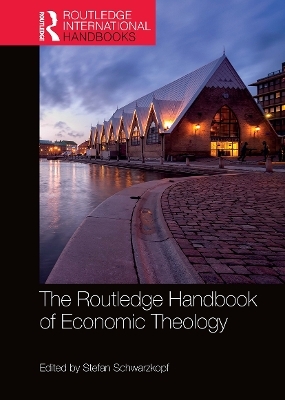
The Routledge Handbook of Economic Theology
Routledge (Verlag)
978-1-032-23753-4 (ISBN)
This Handbook brings together scholars from different parts of the world, representing various disciplines and intellectual traditions. It covers the development of economic thought and practices from antiquity to neoliberalism, and it provides insight into the economic–theological teachings of major religious movements. The list of contributors combines well-established scholars and younger academic talents.
The chapters in this Handbook cover a wide array of conceptual, historical, theoretical and methodological issues and perspectives, such as the economic meaning of theological concepts (e.g. providence and faith); the theological underpinnings of economic concepts (e.g. credit and property); the religious significance of socio-economic practices in various organizational fields (e.g. accounting and work); and finally the genealogy of the theological–economic interface in Judaism, Christianity, Islam and in the discipline of economics itself (e.g. Marx, Keynes and Hayek).
The Routledge Handbook of Economic Theology is organized in four parts:
• Theological concepts and their economic meaning
• Economic concepts and their theological anchoring
• Society, management and organization
• Genealogy of economic theology
Stefan Schwarzkopf is Associate Professor at the Department of Management, Politics and Philosophy at Copenhagen Business School, Denmark. His research focuses on the historical and economic sociology of consumer markets, and he has written widely about the history of markets, consumption, and about the market research industry. Some of his latest work deals with the ascetic-sectarian nature of the new data and electronic surveillance industries. His work has appeared in numerous peer-reviewed journals, including Theory, Culture & Society, Organization Studies and the Journal of Cultural Economy.
Contents Notes on Contributors Acknowledgements 1. Introduction Stefan Schwarzkopf Section 1 Theological Concepts and their Economic Meaning 2. Providence Michael T. Dempsey 3. Eschatology and Eschaton Sigmund Wagner-Tsukamoto 4. Confession Mads Peter Karlsen and Kaspar Villadsen 5. Purgatory Tom Boland and Ray Griffin 6. Faith and Trust Wolfgang Palaver 7. Justification and Salvation Daniel M. Bell, Jr. 8. Guilt Camilla Sløk Section 2 Economic Concepts and their Theological Anchoring 9. Profit Christoph Deutschmann 10. Money Paul Crosthwaite, Peter Knight, and Nicky Marsh 11. Debt and Credit Philip Goodchild 12. Free Choice and Consumer Sovereignty Stefan Schwarzkopf 13. Property and Owning Christina McRorie 14. Prosperity and Wealth Simon Coleman and Martin Lindhardt 15. Poverty Brian Hamilton 16. Corporation Perry Dane 17. Government Mitchell Dean 18. Markets and Marketization Stefan Schwarzkopf Section 3 Society, Management and Organization 19. Time Elden Wiebe and Douglas Harink 20. Calling, Profession and Work Brenda Berkelaar and Patrice M. Buzzanell 21. Organization and Management Bruno Dyck 22. The Entrepreneur Ross B. Emmett 23. Media and Mediation of Culture Jeffrey H. Mahan and David J. Worley 24. Branding and Marketing Russ Belk 25. Hedonism and Asceticism Colin Campbell 26. Leadership Peter Simpson 27. Intellectual Property and Creativity Gabriel J. Michael 28. Accounting and Accountability Alistair Mutch Section 4 Genealogy of Economic Theology 29. The Economic Theology of Judaism Joseph I. Lifshitz 30. Oikonomia Dotan Leshem 31. The Economic Theology of Late Antiquity Devin Singh 32. The Economic Theology of the High Middle Ages Raymond Benton 33. Martin Luther as Economist Philipp Robinson Rössner 34. The Southern Spirit of Capitalism Luigino Bruni 35. Invisible Hand Lisa Hill 36. Adam Smith’s Economics of the Church Paul Oslington 37. The Economic Theology of Quakerism Martin Brigham and Donncha Kavanagh 38. Neoclassical Economics as Theology Robert H. Nelson 39. Marxist Economics and Theology Roland Boer 40. John Maynard Keynes as Theologian David Andrews 41. The Crypto-Theology of Friedrich Hayek Tim Christiaens Section 5 Exit 42. Intellectual Brokerage in Economic Theology: Methodological and Theoretical Reflections from Islamic Banking and Finance Aaron Z. Pitluck Index
| Erscheinungsdatum | 14.12.2021 |
|---|---|
| Reihe/Serie | Routledge International Handbooks |
| Zusatzinfo | 1 Illustrations, black and white |
| Verlagsort | London |
| Sprache | englisch |
| Maße | 174 x 246 mm |
| Gewicht | 721 g |
| Themenwelt | Religion / Theologie ► Christentum ► Kirchengeschichte |
| Wirtschaft ► Allgemeines / Lexika | |
| Wirtschaft ► Volkswirtschaftslehre | |
| ISBN-10 | 1-032-23753-8 / 1032237538 |
| ISBN-13 | 978-1-032-23753-4 / 9781032237534 |
| Zustand | Neuware |
| Informationen gemäß Produktsicherheitsverordnung (GPSR) | |
| Haben Sie eine Frage zum Produkt? |
aus dem Bereich


